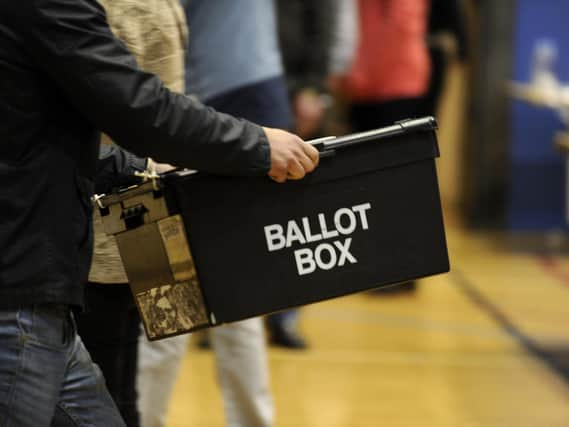Readers' letters: Lib Dems in Amersham win


There are clear parallels with the Amersham by-election.
We all know what happened in 1992 – the seat was comfortably regained by Nigel Evans for the Conservatives!
As in 1991/1992, Conservatives do have lessons to learn and, I’m sure, they will be learned.
Advertisement
Hide AdAdvertisement
Hide AdWhat is interesting is that the Lib Dem victory has been attributed to their opposition stance on two issues– planning reforms and HS2
Amazingly, hitherto Liberal Democrats have claimed to be the most supportive party of HS2 and ‘Support HS2’ and ‘ensure that HS2 opens as early as possible’ were two of their explicit 2019 manifesto commitments.
Indeed it was one of their 12 ‘key’ commitments!
The new MP’s pledge to fight HS2 will, therefore, surely bring her into conflict with her new colleagues.
On planning, their 2019 manifesto was distinctly vague ( I wonder why) beyond promising 300,000 new homes each year.
Advertisement
Hide AdAdvertisement
Hide AdPresumably there would now be an addendum ... ‘but not in Amersham.’
As was clearly displayed in Amersham, the ‘audience’ rather than consistency still guides Liberal Democrat tactics and promises.
Neil Cartwright
via email
politics
Apathy of
the populace
Having followed politics one way or another for all my adult life, I find that I have never been so disillusioned with the state of politics in this country as it is now.
The spin being perpetrated day in and day out by this Government is nothing short of a national disgrace.
Advertisement
Hide AdAdvertisement
Hide AdThe now defunct and discredited chief adviser Cummings has produced damming emails supposedly to have come from the great leader to himself saying that Hancock was ***** hopeless with regard to ppe procurement and protecting the care homes and yet, even with all this damming evidence, what we find is Boris stands up and trumpets that he has “full confidence” in Hancock.
He is backed up by Conservative ministers on seemingly every TV channel.
Politics for me is in the gutter and with no effective opposition to speak of.
I think that the British public has, for the last 10 years, got so blasé with what’s been going on that they have washed their hands of politics in general and are just putting up with the reality of how it is.
Advertisement
Hide AdAdvertisement
Hide AdThis Government thinks it can get away with anything and with the general resignation and apathy of the populace that’s just what is happening.
M Tipper
Penwortham
economy
Don’t suspend triple lock
This time last year, speculation that earnings growth in 2021 could exceed 18 per cent was used to justify calls to pre-emptively suspend the triple lock, which increases the state pension in line with whichever is highest out of earnings, inflation or 2.5 per cent.
Ultimately the Government decided against ditching its manifesto pledge and delivered the 2.5 per cent rise due – which worked out at a weekly increase of £4.40 to the New State Pension and £3.35 to the Basic State Pension.
But now the argument is being made again. Although that 18 per cent figure has clearly not materialised, this year the formula is set to deliver an increase in line with earnings growth, which is currently running at 5.6 per cent.
Advertisement
Hide AdAdvertisement
Hide AdWe don’t yet have the figures for the relevant May to July period. But even if we do see higher than usual earnings growth, the Government would be unwise to drop its support for the triple lock for three reasons.
The measure was introduced in 2010 to undo the damage caused by the decision to de-link the state pension from earnings in 1980.
During the three decades when the Basic State Pension was linked to prices, which generally increase more slowly than incomes, it lost around 40 per cent of its value relative to average earnings. This means that, even after 10 years of the triple lock, the UK state pension is less generous than most comparable countries.
On average our state pension provides a replacement rate of just over 20 per cent of pre-retirement income. The average among countries in the Organisation for Economic Co-operation and Development is almost twice as high, and European Union citizens enjoy an average replacement rate of over 45 per cent.
Advertisement
Hide AdAdvertisement
Hide AdThe triple lock has 30 years of decline to undo. It will take more than one ‘good year’ to achieve this.
Until our pensions can be compared to neighbouring countries, talk of scrapping the triple lock is premature.
We spend less on our state pension than many countries.
In 2019, spending on state pensions in the UK amounted to 4.7 per cent of gross domestic product – less than half as much as countries like France and Austria.
And we’ve learned over the last year and a half that the argument that ‘we can’t afford that’ doesn’t wash. What this Government decides to spend money on reflects its political priorities, not the current economic reality. Calls to suspend or modify the triple lock are just part of a wider attempt to return to the failed policies of austerity that did so much damage after 2010. We saw in that period that ideologically driven attempts to constrain public spending can damage the public finances by restricting economic growth.
Advertisement
Hide AdAdvertisement
Hide AdThe Government can’t make the same mistake again. Boosting the incomes of pensioners can play a significant role in restoring local economies after the devastating impact of Covid-19.
The argument that moving away from the triple lock would benefit young people is disingenuous at best. Young workers would be the biggest losers from any attempt to water down the triple lock, because the increases it delivers accumulate over time.
Derek Barton
Chair, North West Regional Pensioners Association